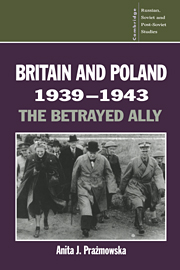Book contents
- Frontmatter
- Contents
- Preface
- Map
- 1 The formation of the Polish government-in-exile: ideology and war plans
- 2 Britain and German expansion in Eastern and South-eastern Europe
- 3 Britain's only fighting ally
- 4 Britain, Poland and the Soviet Union: June–December 1941
- 5 1942, year of disappointments
- 6 The illusion of an alliance ends
- 7 1943, the end of Polish–Soviet co-operation
- Conclusion
- Notes
- Bibliography
- Index
- Titles in the series
Conclusion
Published online by Cambridge University Press: 29 September 2009
- Frontmatter
- Contents
- Preface
- Map
- 1 The formation of the Polish government-in-exile: ideology and war plans
- 2 Britain and German expansion in Eastern and South-eastern Europe
- 3 Britain's only fighting ally
- 4 Britain, Poland and the Soviet Union: June–December 1941
- 5 1942, year of disappointments
- 6 The illusion of an alliance ends
- 7 1943, the end of Polish–Soviet co-operation
- Conclusion
- Notes
- Bibliography
- Index
- Titles in the series
Summary
At the Tehran conference Churchill was anxious to place the Polish issue into the context of agreements made with the Soviet ally. The Soviet Union, which hitherto had sought to clarify the issue of Poland's eastern border, and used it as a test of British and American goodwill, now merely responded to British initiatives.
During Churchill's meeting with Stalin on 28 November 1943 both sides accepted that the Soviet Union would not return the territories annexed in September 1939 and Poland would be compensated for this loss in the west. As Churchill summarized, ‘Nothing was more important than the security of the Russian Western frontier’. British obligations to Poland were subsidiary to this consideration. Both leaders accepted that the redrawing of Poland's borders would take place without Polish participation. Churchill later described the way in which the future map of Poland was agreed: ‘this was all informally between themselves and they could go to the Poles later’. Even if Churchill had not meant this to imply that Polish agreement was irrelevant, this is how Stalin understood the above statement. On 1 December during discussions between the three leaders Stalin was visibly irritated by Roosevelt's suggestion that the Polish government's acceptance of the decisions made by the Big Three would be desirable. Stalin interrupted Churchill to say that when he had previously discussed the matter with Churchill he understood this to be ‘the question of prescribing something to the Poles’.
- Type
- Chapter
- Information
- Britain and Poland 1939–1943The Betrayed Ally, pp. 191 - 198Publisher: Cambridge University PressPrint publication year: 1995

